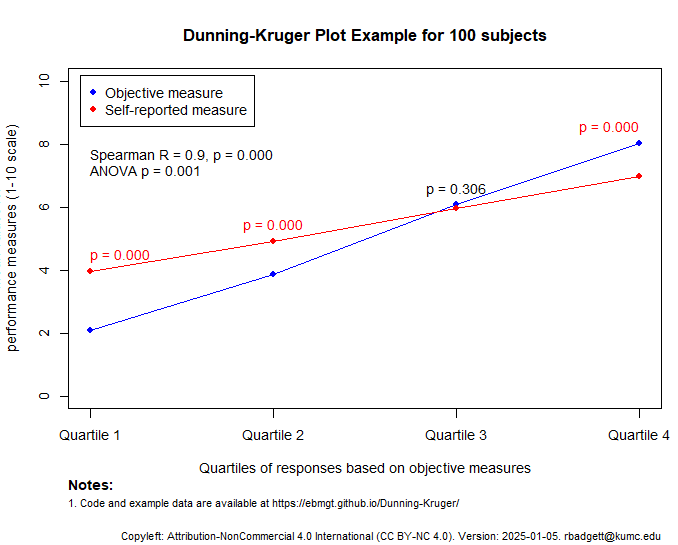Example plot

Source code and data:
The typical finding is two lines that intersect and show that higher performers underestimate themselves and low performers over-estimate themselves.
- In this example, the two lines are correlated, but the means of each quartile are not the same.
- Source code (Copyleft: CC BY-NC 4.0).
Plots with real study findings
Managers self-assessment
Dunning-Kruger plot using data from Van Velsor, 1993. DOI
 Source: WikiDoc. File:Van Velsor. Leadership Dunning-Kruger chart. Hman Resource Management 1993.png and xlsx (CC BY-NC 4.0).
Source: WikiDoc. File:Van Velsor. Leadership Dunning-Kruger chart. Hman Resource Management 1993.png and xlsx (CC BY-NC 4.0).
Collins found a similar plot of physicians' readiness to lead across quartiles of their understanding of the difference between leadership versus management. Their findings suggest that physicians who feel most ready to lead actually have the least understanding of leadership versus managment.
Emergency medicine doctors: self assessment
Badgett and Duran 2017. Plot at DOI: 10.1017/cem.2017.419). Comment on Kadhim-Saleh. Dunning-Kruger and ordering CT-scans. CJEM. 2017 PMID 28673374
References
- Collins RT, Purington N, Roth SJ. Physician Understanding of and Beliefs About Leadership. J Healthc Manag. 2022 Apr 1;67(2):120–136. PMID: 35271522
- Davis DA, Mazmanian PE, Fordis M, Van Harrison R, Thorpe KE, Perrier L. Accuracy of physician self-assessment compared with observed measures of competence: a systematic review. JAMA. 2006 Sep 6;296(9):1094–1102. PMID: 16954489
- Kruger J, Dunning D. Unskilled and unaware of it: how difficulties in recognizing one’s own incompetence lead to inflated self-assessments. J Pers Soc Psychol. 1999;77(6):1121. DOI: 10.1037/0022-3514.77.6.1121
- Van Velsor E, Taylor S, Leslie JB. An examination of the relationships among self-perception accuracy, self-awareness, gender, and leader effectiveness. Hum Resour Manage. 1993 Jun 1;32(2–3):249–263. DOI: 10.1002/hrm.3930320205
- Additional studies at Zotero

Aurora Borealis from Coronado Heights, KS on Oct 10, 2024.
Salina, KS is 20 miles away on the horizon. CC BY-NC 4.0
Salina, KS is 20 miles away on the horizon. CC BY-NC 4.0